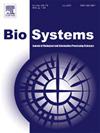Cooperation in structured populations via coupled reputation and learning: A spatial evolutionary game approach
IF 1.9
4区 生物学
Q2 BIOLOGY
引用次数: 0
Abstract
This study presents an agent-based model to investigate cooperation dynamics in spatial evolutionary games by integrating memory-based reputation tracking with heterogeneous adaptive learning. Agents interact on a lattice network and update their strategies based on both neighbors’ historical cooperation rates and payoff differences, governed by a modified Fermi rule with individual sensitivity parameters. Simulation results demonstrate that this dual-layered mechanism sustains cooperation even under strong defection incentives and limited interaction ranges. The model also reveals how memory length and learning heterogeneity jointly influence spatial cooperation patterns and strategy diversity. These findings offer new insights into decentralized mechanisms that promote cooperation in structured populations, with implications for evolutionary biology, distributed systems, and behavioral economics.
基于声誉和学习的结构化群体合作:空间进化博弈方法
本研究将基于记忆的声誉跟踪与异质自适应学习相结合,提出了一种基于智能体的空间进化博弈合作动力学模型。智能体在晶格网络上相互作用,并根据邻居的历史合作率和收益差异更新策略,由具有个体敏感性参数的修改费米规则控制。仿真结果表明,即使在强背叛激励和有限互动范围下,该双层机制仍能维持合作。该模型还揭示了记忆长度和学习异质性如何共同影响空间合作模式和策略多样性。这些发现为促进结构化群体合作的分散机制提供了新的见解,并对进化生物学、分布式系统和行为经济学产生了影响。
本文章由计算机程序翻译,如有差异,请以英文原文为准。
求助全文
约1分钟内获得全文
求助全文
来源期刊

Biosystems
生物-生物学
CiteScore
3.70
自引率
18.80%
发文量
129
审稿时长
34 days
期刊介绍:
BioSystems encourages experimental, computational, and theoretical articles that link biology, evolutionary thinking, and the information processing sciences. The link areas form a circle that encompasses the fundamental nature of biological information processing, computational modeling of complex biological systems, evolutionary models of computation, the application of biological principles to the design of novel computing systems, and the use of biomolecular materials to synthesize artificial systems that capture essential principles of natural biological information processing.
 求助内容:
求助内容: 应助结果提醒方式:
应助结果提醒方式:


